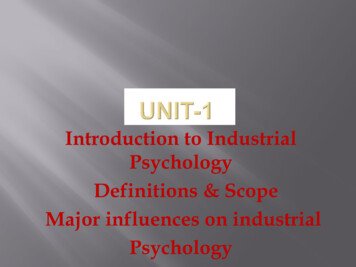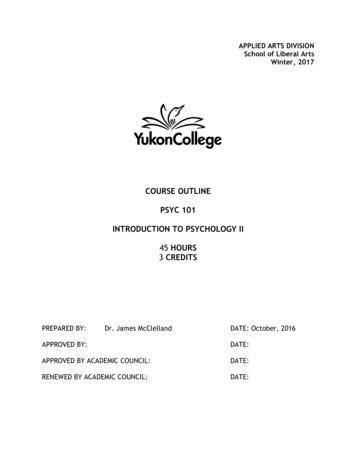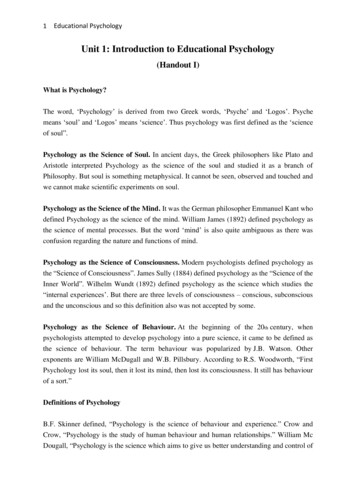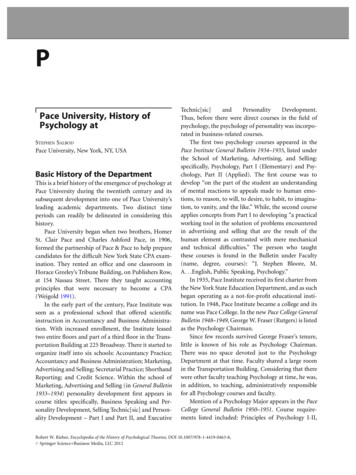
Transcription
Introduction to IndustrialPsychologyDefinitions & ScopeMajor influences on industrialPsychology
The word Psychology comes from the latin word, ““Psychologia”.It is comprised of two words, Psycho means mind andLogy/ Logus means study.It thus means the study of the mind and how it works. Italso means the usual way in which a particular personor a group thinks and reacts.
Industrial Psychology is the study of people atwork in industry and business.The two words "industry” simply pertains toactivities relating to manufacturing, trade orbusiness. The word ‘psychology’ denotes thescience of the nature, functions andphenomena of the mind or mental activitiesof a human being or simply put psychologyof human behavior.
Industrial Psychology is the study ofpeople at work, the study of theiraptitudes, and their qualificationsfor jobs. It includes the principlesand practices of training in theskills and attitudes for Industrialwork.
Industrial Psychology is acomplete study of manythings but primarily, it is thestudyofpeopleasindividuals or in groups –atwork situation.
The study of people as ‘individuals’involves studying the qualificationsof a person for a job, his workhistory, his intelligence, his specialaptitudes and interests and aboveall, relating these qualifications tothe requirements of the job andinterpreting the results.
Since Industrial Psychology is the study of peopleat work and is concerned with the entire spectrumof human beings. Its scope is the entire process ofmanagement dealing with people at work. There ishardly a field in industry where humanunderstanding is not required; there is hardly aproblem in industry and business where humanaspect is not involved and hence there is hardly anarea in which industrial psychology cannot play itsrole. Industrial psychology is a useful aid to theefficient management of people at work.
RecruitmentSelection and PlacementExecutive Development and TrainingPromotional SchemesMotivationAttitude and MoraleWages and Salary AdministrationHuman RelationAccident Prevention
Appropriate matching of job requirement with theemployee's abilities lead to reduction in the cost ofhiring, supervision and production. Accurate jobanalysis, standardized application forms, scientificscreening of applications, use of psychologicaltests for vocational fitness, final overall rating andcontinuous review and check-up of the entireprogramme are some of the spheres where thepsychologist can make an important contributionseveral psychological tests may be developed forthe proper screening of the people.
Right man should be selected for the right job andindustrial psychology helps in this effort also. Itdevelops various devices such as interviews andpsychological tests in order to achieve theobjective of the selection. It also helps theplacement of workers at different jobs scientificassignment of job is possible only with the help ofindustrial psychology.
A psychologist by studying and unication and supervision vitalizes thealready practiced managerial psychology.Individual differences can well be measuredby psychological study of the people fortraining purposes. Continuous and effectiveuse of the capabilities of workers necessitatestraining of the workers and supervisors.Psychology determines what type of trainingshould be given to the workers.
Why a man should be promoted ortransferred or demoted or discharged. Theseemployment situations should be based onabilities,usefulnessandseniority.Performance appraisal is one of thepsychological techniques to recognize thepeoples' ability mere seniority should not bethe guiding principle for promotions.
The psychologists assume that the causes of differenttypes of human behavior in industry and business arethe needs or the motives that drive an individual tobehave in a particular way. Industrial psychologyproblems into behavior of people at work to determinethe conditions in which an individual or people at workto determine the conditions in which an individual feelsmotivated and is willing to work whole-heartedly tomaximize the productivity. Industrial psychology hasidentified the financial and non-financial incentiveswhich are used by the management to motivate thepersonnel.
The psychologists have established therelationship between the attitudes of theemployees and their performance.Psychological studies outline the majorfactors favorable or detrimental to goodmorale and give some class as to the stepswhich can be taken to give furtherunderstanding of needs, perceptions,satisfaction and motivation of people inrelation to their working situations.
The wage rates in the industry should be fixedon some suitable and scientific formula. Thepsychologists have developed the techniques ofjob evaluation, merit-rating and job analysis asbasis for rational wage and salary structure.Job evaluation and merit-rating are thetechniques which evaluate the worth of the joband of the man respectively.
Human relations may briefly be described asthe relations or contacts among individuals inan organization and the group behavior thatemerges from these relations. The modernindustrial psychologists treated people inindustry as human being and have madesignificantcontributiontoindustrialmanagement by developing concepts andtechniques of effective leadership. Theysuggest the possible ways and means to solvetheindustrialstrife.
The psychological studies show that98% of the accidents in industry arepreventable. It means personal orpsychological factors play an importantrole in any programme of accidentprevention. Monotony and fatiguestudies help in minimizing theaccidents. Psychologists have made thecontributionofsignalstothedevelopment of safety programme andthe preservation of human factor inindustry.
Work Behavior Management Environmental Design Product Design Human Relations
Avoid Criticizing People Don’t Condemn People Don’t Complain Against People Give Your Sincere and HonestAppreciation to People Arouse in Other Person an Eager Want Be Genuinely Interested in Other People To Make a Good FirstImpression .Smile Call the People by Their First name Be a Good Listener
Keep Other Person’s Interest in Mind While Talking Make the Other Person Feel Important Don’t Attempt to win on Argument Never say to Other Person “You are Wrong” If You are Wrong Admit it Begin Your Talk in Friendly Way Ask Gentle Question to Get “Yes, Yes” Response Let the Other Person Do a Great Deal of the Talking Give the Other Person Feeling that the Idea is His Try to See Things from other Person’s Point of ViewBe Sympathetic with the Other Person’s Ideas and Desires You Must Appeal to the Nobler Motive You should Dramatize Your ideas You may Throw Down a Challenge to Others
Good human relations can only be established ifthe needs of an individual are satisfied and his/herwill to work is stimulated. This presents thedifficulty that management is dealing with a groupof individuals, all of whom may responddifferently in a given situation.
The findings, principles and techniques of industrial psychology may havemajor influence in the following few areas of management:Employee selection and placementEmployee training and executive development Human Engineering (Equipment design) Motivation Morale Counseling Financial Remuneration Working conditions
The scope of industrial psychology is toselect the right person for the right job inthe organization for which one shouldmeasure the candidate’s aptitudes, skills,intelligence, interests and temperaments.Industrial psychology provides a valuabletest for measuring these characteristics inthem.
After careful selection of people using tests andinterviews what is needed is training theexecutives. In organizing an executivedevelopment programme, the industrialpsychologist keeps a range of goal in mind ofincreasing the effectiveness of the executivegroup.
It is the designing and lying out equipment in order toget the greatest efficiency of man- machine system.The industrial psychologist working in humanengineering provides data on which management candecide to improve the design, improve the productfor the comfort of the users and to increase the sale.It also helps in reducing machine breakdowns,wastage or raw materials, to minimize accidents, andto introduce better performance and job satisfaction.
Industrial psychology probes into behavior ofpeople at work to determine the conditions in whichan individual feels motivated and is willing to workwholeheartedly to maximize his productivity.Industrial psychology has contributed a lot to thisarea of management by identifying the financialand non-financial incentives that can be used by themanagement to motivate the workers. Thus thesolution to the question of how to motivate peoplein work has been answered by industrialpsychology.
Another scope of industrial psychology is counseling.This aspect takes in to consideration the twoapproaches, one is when a candidate applies for a newjob in the organization counseling him to select andsecond counseling to an existing for his maladjustmentwith the organization. Industrial psychology helps themanagement in counseling employees in the mostscientific and systematic manner to find the solution tothe problem of misplacement of employees.
Industrial psychology studies themotivation process and suggests thetype of incentives to be provided todifferenttypesofpersonnel.Individual and group incentivesystems may be devised using the helpof industrial psychologist.
The data, provided by industrialpsychology is essential for theengineers to design the propermachine and equipment, tools etc.,to get the greatest efficiency ofman-machine system.
In general scientific management is definedas the use of the scientific method to definethe “one best way” for a job to be done.AccordingtoTaylor,“ScientificManagement is the substitution of exactscientific investigation and knowledge forthe old individual judgment or opinion inall matters relating to the work done inthe shop.”
Fayol began by classifying all operations in businessorganizations under the following six categories:Technical (production)Commercial (purchases and sales)Financial (funding and controlling capital)Security (protection)Accounting (balance sheet, costing records) andAdministrative or Managerial (planning, organizing,commanding, coordinating and controlling).Fayol pointed out that managerial activity deservedmore attention. In his view, management is theprocess composed of five elements of functions:planning, organizing, commanding, coordination andcontrol.
To plan means to study the future andarrange the plan of operations.To organize means to build up the materialand human organization of the business.To command means to make the staff dotheir work.To coordinate means to unite all activitiesand to control means to see that everything isdone in accordance with the standards thathas been laid down.
Scientific management school of thought wasdeveloped by the pioneering contributions ofindividual like Charles Babbage, Fredrick W.Taylor, Gilbreth and Henry Gantt. Theydeveloped the managerial skill of job designthrough the division and specialization of laborand formulated the first approaches to massproduction. They were the first to placeimportance on both the selection and trainingof workers.
However, there are a number of limitations to beconsidered in this school of thought.The scientific management’s applications foundto be useful only in stable work environment butnot in dynamic complex organizations.The contribution placed too much emphasis onrational and economic nature of man.They tried to apply universal managementprinciples to every work situation, withoutrecognizing the uniqueness of some workenvironment.
Thehumanrelationsapproachtomanagement developed as a result of a seriesof experiences (in all four) conducted byElton Mayo and his associates F.J.Reothlisherger and W.J. Dickson at theHawthrone plant of the Western ElectricCompany at Chicago in United States. TheHawthrone studies were aimed at finding outwhatfactorsreallyinfluencedtheproductivity and work performance ofworkers.
The main findings of Hawthorne studies were as follows:1. Physical environment at work place (i.e., working conditions)do not have any material effect on the efficiency of work.2. Social or human relationship influenced productivity moredirectly than changes in working conditions.3. Favorable attitudes of workers and work-teams towards theirwork were more important factors determining efficiency.4. Fulfillment of workers social and psychological needs have abeneficial effect on the morale and efficiency of workers.5. Employee groups formed on the basis of social interactions andcommon interest exercised a strong influence on workers,performance. In other words, informal organization controlled thenorms established by the groups in respect of each member’soutput.
First Experiment on illuminationThree departments were selected for theconduction of this experiment. In the firstdepartment, inspection of small parts was done ,in the second department the relays wereassembled and in the third department ,windingof coils was done.
THANK YOU
industrial psychology helps in this effort also. It develops various devices such as interviews and psychological tests in order to achieve the objective of the selection. It also helps the placement of workers at different jobs scientific assignment of job is possible only










